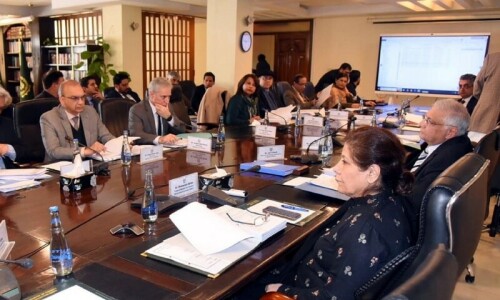ISLAMABAD: The Economic Coordination Committee (ECC) of the cabinet has failed to approve a clear-cut cash credit limit to the provinces and other stakeholders for wheat procurement despite two days of lengthy meetings.
Informed sources claimed that a lack of experience in handling public interest matters appeared to be the key factor, as the ECC, led by Finance Minister Muhammad Aurangzeb, was itself confused as to why the government should approve credit covers instead of allowing wheat operations to market forces.
This indecision comes despite expectations of a bumper wheat harvest this year, with projections safely surpassing 28 million tonnes, and some estimates even pointing towards a record 29m tonnes.
The ECC members, many of whom are new to the committee, were briefed by bureaucrats about the very basics of the wheat operations on technical grounds, and political angles that may come up in the following meeting of the federal cabinet.
‘Inexperience, confusion’ mar meeting, new members given basic briefing on wheat operations
Most participants were unaware of the wheat prices in the market. Various wheat prices were quoted, starting from Rs3,200 per 40kg, although official support price fixed by various provincial governments were higher than Rs4,200 per 40kg.
The procurement rate set by Passco, the country’s agency responsible for maintaining strategic food stocks, would be Rs3,900 per 40kg, followed by Rs4,000 of Sindh and Rs4,300 of Balochistan. On the insistence of the secretaries of finance and food, it was decided that incidental charges would be borne by the respective provincial governments.
A participant told Dawn that the ECC finally approved about Rs275 billion cash credit limit for wheat operations of smaller stakeholders to ensure procurement of 2.45m tonnes in the public sector.
This, however, did not include the largest producer and stakeholder, Punjab, that last year procured 4.5m tonnes alone — almost more than double the procurement by all other participants. This time around, it neither committed any procurement target nor sought a cash credit limit.
Of the total 2.45m procurement targets with Rs274.7bn credit requirement, Passco would pick 1.4m tonnes from the farmers with a credit limit of Rs169bn, followed by one million tonnes by Sindh worth Rs100bn and 50,000 tonnes by Balochistan with Rs5.7bn. This apparently meant the bumper wheat output had put the farmers in a difficult position and being exploited by financially strong market forces.
Minister for Industries Rana Tanveer Hussain, who has also been given the additional portfolio for the Ministry of National Food Security, also attended the ECC meeting on the second day in view of the challenging discussions on the first day.
Mainly because of this, the ECC could not find a way forward on Thursday on the issue and decided to call provincial governments for their advice and input. The provinces joined the extended ECC meeting on Friday, marred by inordinate delay on part of the finance minister to attend the meeting.
The two-day ECC meeting schedules kept on rolling because of interventions by the Prime Minister’s Office for other engagements. As a result, the Ministry of Finance could not issue a customary concluding statement about the ECC decisions on both days which would now be “checked” by the PM Office. It would be first time that the public as well as the farmers would remain unaware about their fate in meetings held at their expense and attended by public representatives.
The ECC approved about Rs200bn cash credit limit to the Sindh government, half of that for the procurement of about one million tonnes of wheat and the remaining half for past rollovers. Another official explained that fresh Rs100bn approval was only for one million out of fresh crop.
Punjab declined to seek credit limit, stressing that it would intervene into the market when it finds reasonable evidence about farmers being fleeced and to come to their aid for official stocks at approved wheat support price.
The new ECC members were told that cash credit limits were approved by the committee for the provinces and federal agencies to raise funds from the financial sector and the State Bank of Pakistan to keep a cap on public loans and guarantees.
In the absence of such an arrangement, the provinces had created huge liabilities and overdrafts in commodity operations a couple of years back. With the intervention of the finance ministry and the international Monetary Fund (IMF), these commodity operations and liabilities were gradually brought to sustainable levels.
The Ministry of National Food Security warned the ECC that even the proposed targets for this year by Sindh, Balochistan and Passco at 2.45 million tonnes were “insufficient to mitigate the provincial requirements despite the presence of carry-forward stocks of 3.25m tonnes as of last month. It put on record that public wheat procurement target for last year (2023) was set at 7.8 million tonnes, including 4.5m tonnes of Punjab.
The meeting was told that the public sector, comprising Passco and provincial governments, procures local wheat on the profitable support price announced by the federal cabinet to stabilise wheat prices and to ensure fair returns to farmers during the post-harvest period.
Passco procures wheat from Punjab, Sindh and Balochistan and supplies it to deficit provinces, areas and agencies. Similarly, provincial food departments procure wheat from their growers and release it to the flour mills of the respective province as per the release policy approved by provincial cabinets.
Published in Dawn, April 6th, 2024














































Dear visitor, the comments section is undergoing an overhaul and will return soon.